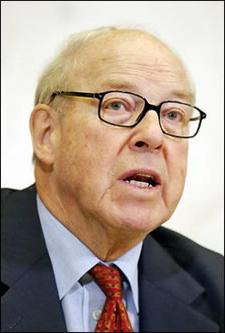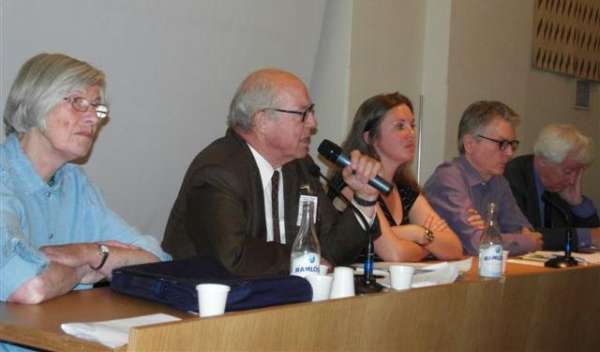
Welcome to the ezine produced by SGI Buddhists that prompts the positive, kindles the constructive, highlights the hopeful and leaves you feeling - well, up!


The seminar was headed up by Hans Blix, (Chairman of Weapons of Mass Destruction Commission), and various colleagues and allies that make up Sweden’s Nuclear disarmament network, writes Rachel Aspögård.
Dr Blix talked about the facts since the commission published its report three years ago. At that time the disarmament and non-proliferation momentum of the early post-Cold War years had been lost and the outlook was desolate. As well, new nuclear armed states have emerged, disarmament negotiations were completely stalled, and the commitment to the Nuclear Non-Proliferation Treaty (NPT) was eroding.
Dr Blix opened his address by saying that: ‘President Obama deserves credit for having the courage and wisdom to acknowledge the advice from the US bipartisan group formed by former US statesmen George Shultz, Henry Kissinger, William Perry and Sam Nunn.’ This group successfully reminded the US public recently that the Cold War finished twenty years ago, and that the US and Russia now have an opportunity to create change and lead the world cooperatively towards real disarmament.
Dr Blix emphasised that, 'The Weapons of Mass Destruction Commission can be a great source of good reasoning and detailed recommendations, as well as a real utility to all those now working in government, the media and civil society’ It’s also encouraging that President Obama, President Medvedev and many other political leaders are coming out in support for a clear goal for a world free of nuclear weapons. The Commission also thinks this is attainable, stressing that those governments should now think about how they will design the future security of their countries without weapons of mass destruction.
In light of this hopeful, positive move forward, with President Obama re-opening the way, discussions about long-term goals for arms control must be the central focus. Now is not the time to have our attention diverted – disarmament measures must be tackled today!
The philosophy of WMDC is also about long term goals, and such goals should not just be about 'words - but deeds' stressed Dr Blix. The time is now for a momentum to be created by agreement on following up the Strategic Arms Reduction Treaty 1 (Start1), for example, as well as further ratifications of the Comprehensive Test Ban Treaty (CTBT). In light of this, a world summit would offers leaders an opportunity to accelerate the agenda for nuclear disarmament.
The entry into force of the CTBT would have more positive ramifications for arms control and disarmament than any other single measure, according to the WMDC. At present, the arena has seen the hopeful commitment by President Obama to move forward with US ratification but without it, nothing changes. Once the US ratifies other powerful member states will move too.
'President Obama and President Medvedev have jointly stated their support for a verifiable treaty (the FMCT) to end the production of fissile materials for nuclear weapons,' stated Dr Blix, 'and this is encouraging. However, future agreements to reduce the arsenals of nuclear weapons can be strengthened by such a treaty.'
So, what needs highlighting now? It is the need to review the NPT, to address existing arsenals and the threat of proliferation of nuclear weapons. Also, there is the problem of non-state actors using terrorist methods to acquire weapons of mass destruction – this is a modern-day threat and a real hazard. In this regard, the Commission is in agreement that countering this threat demands tighter control over not only nuclear material but the other sensitive material, equipment and technology that goes along with it.
This time next year the 8th Review Conference of the NPT will take place against a backdrop of widespread concerns - breaches that have occurred or might occur; the absence of serious disarmament efforts; and lack of progress towards a nuclear weapon free zone in the Middle-East. It is now vital to use the conference in 2010 to strengthen the NPT and revive nuclear disarmament.
With this goal in mind, the NPT is rightly seen as expressing the aspiration of the international community to be free from nuclear weapons, and the 2010 Review Conference needs to focus on reducing both the role and number of nuclear weapons in states parties.
'In concluding its aims and collective work,' said Dr Blix, 'the Weapons of Mass Destruction Commission urges all governments, groups, movements and individuals who work for disarmament to redouble their efforts at the present hopeful and crucial time.'
While the adoption of this declaration marks the conclusion of the Commission’s collective work, its members will remain active and be ready to join others in a new force wave to revive - and achieve - global nuclear disarmament.
Author: Rachel Aspögård attended this meeting with Dr Blix and the colleagues of Swedish Network for Nuclear Disarmament. The lay Buddhist organisation SGI (Soka Gakkai, Sweden), is part of this network and will hold an anti-nuclear weapons exhibition in Stockholm, Sweden, in November this year, called ‘A proposal for a peaceful world’.


